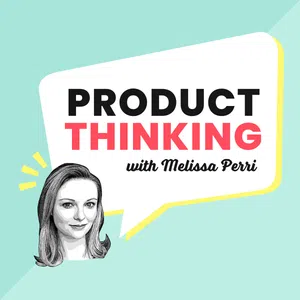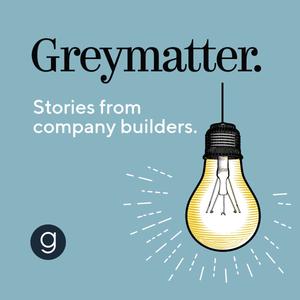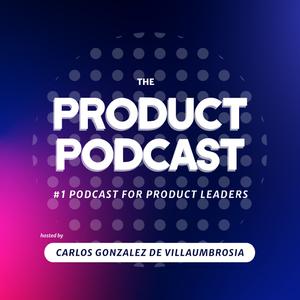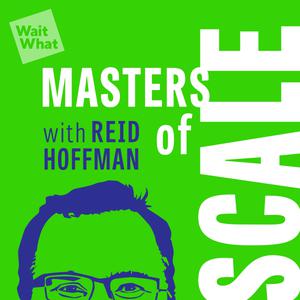
Product Thinking
Melissa Perri
Successful product management isn’t just about training the product managers who work side by side with developers everyday to build better products. It’s about taking a step back, approaching the systems within organizations as a whole, and leveling up product leadership to improve these systems. This is the Product Thinking Podcast, where Melissa Perri will connect with industry leading experts in the product management space, AND answer your most pressing questions about everything product. Join us each week to level up your skillset and invest in yourself as a product leader.
- 42 minutes 49 secondsEpisode 207: Mastering Predictable Product Success with the ODI Strategy with Tony Ulwick
In this episode of the Product Thinking Podcast, Melissa Perri welcomes Tony Ulwick, the founder and CEO of Strategyn, and the pioneer behind the jobs-to-be-done theory and Outcome-Driven Innovation (ODI).
Tony shares insights from his groundbreaking work in redefining product development and innovation. He discusses the importance of separating innovation from development processes and why focusing on customer outcomes rather than features leads to more successful products.
Whether you’re a product manager looking to refine your approach or a leader aiming to align teams around customer needs, this episode is a treasure trove of practical guidance and deep insights into mastering the art of innovation.
Tune in to discover how you can leverage ODI to drive your product strategy towards success.
You’ll hear us talk about:
- 14:22 - Front-End Innovation vs. Development Process
Tony explains the importance of distinguishing between the innovation process—where the product concept is formed—and the development process, where Agile methods come into play. This separation ensures that only market-winning concepts proceed to development.
- 19:41 - Understanding Customer Needs
Tony outlines the steps in Outcome-Driven Innovation, focusing on identifying and addressing customer needs to enhance product success. He emphasizes defining markets and needs before devising solutions.
- 28:06 - Aligning Teams on Customer Needs
Tony shares strategies to encourage organizational alignment on the definition and prioritization of customer needs, ensuring all teams work towards a common goal.
Episode Resources:
22 January 2025, 5:00 am - 42 minutes 54 secondsEpisode 206: Building and Scaling Zero to One Products with Uday Marepalli
In this episode of the Product Thinking Podcast, I am joined by Uday Marepalli, Director of Product Management at Upwork, who brings his expertise from leading AI-driven initiatives to our conversation. Uday shares his insights on building zero to one products within large organizations, emphasizing the importance of understanding customer needs and leveraging AI in product development.
This episode dives into the challenges and strategies for innovating in a way that aligns with both customer expectations and technological capabilities. Want to learn how to effectively launch and scale products in complex environments? Tune in to gain practical insights from Uday's extensive experience in product management.
You'll hear us talk about:
- 06:24 - The Thrills and Challenges of Zero to One Products
Uday delves into the unique excitement and difficulty of creating something from nothing, stressing the importance of balancing speed with thoughtful validation of hypotheses
- 14:37 - Handling Conflicting Information and Making Strategic Pivots
Uday discusses how to manage new, sometimes contradictory, information by aligning it with the overarching vision and deciding whether to iterate or pivot.
- 38:54 - Building AI Zero to One Products
Uday explores the peculiar challenges of AI products, including data collection and ensuring trust and explainability in AI-driven decisions.
Episode Resources:
💡 If you enjoyed this conversation, make sure to subscribe to the Product Thinking Podcast to catch all the new episodes.
15 January 2025, 6:00 am - 52 minutes 48 secondsEpisode 205: Revolutionizing Workforce Agility Through AI with Karthik Suri
Join Melissa Perri in this insightful episode of the Product Thinking Podcast as she chats with Karthik Suri, Chief Product Officer at Cornerstone OnDemand. Recognized for his expertise in leveraging AI for workforce development, Karthik shares innovative strategies on bridging skill gaps and creating personalized career pathways through generative AI and data intelligence. They explore the transformative potential of AI in talent development, emphasizing the need for a blend of technical and human-centric skills to thrive in today’s dynamic work environment.
Discover how AI is reshaping talent management and why human skills are increasingly in demand, surpassing digital skills threefold. Karthik highlights the significance of adaptable enterprise software that aligns with the evolving needs of workforces.
Curious about how to prepare your organization for the future with AI-driven insights? Tune in to explore the intersection of AI, skills development, and workforce readiness.
You’ll hear us talk about:
- 23:52 - Harnessing AI for Skill Detection and Career Growth
Karthik explains how generative AI can assess skills through various data sources, creating holistic profiles for employees. This approach helps organizations identify and develop the necessary skills for career progression.
- 29:09 - Building a Unified Product Strategy
Karthik shares insights on the importance of a unified user experience and a platform mindset for product strategy. He discusses how integrating design systems and data structures across products enhances customer outcomes.
- 42:57 - Ethical AI in Performance and Skills Evaluation
The conversation delves into the ethical considerations of using AI for performance reviews, highlighting the importance of accountability, explainability, and bias mitigation.
Episode Resources:
13 January 2025, 12:48 pm - 53 minutes 16 secondsEpisode 204: Building Women's Health Products: From Validation to Scale with Inessa LuryeInessa Lurye, former Senior Director of Product and Head of Women's Health at Hinge Health, joins Melissa Perri to discuss the intricacies of launching zero-to-one products within established organizations. Drawing from her experience in developing Hinge Health's comprehensive women's pelvic health program, Inessa shares valuable insights on building business cases, validating products through experimentation, and scaling healthcare innovations responsibly. Her unique perspective spans from government service to leading product development at a $6 billion digital health company.2 January 2025, 5:00 am
- 8 minutes 42 secondsEpisode 203: Christmas Special Greatest Hits 2024: Mastering Product Leadership Through Research, Goals, and GrowthIn this special holiday episode of the Product Thinking Podcast, Melissa Perri curates the most impactful insights from 2024's top episodes. Featuring conversations with industry leaders including Steve Portigal on user research evolution, Quincy Hunte on decision-making at scale, Jeff Gothelf and Josh Seiden on OKRs, Kate Leto on leadership coaching, and Leah Tharin on product-led growth. This compilation episode showcases key learnings that shaped product thinking throughout the year, offering valuable perspectives on research, leadership, goal-setting, and growth strategies.24 December 2024, 5:00 am
- 45 minutes 23 secondsEpisode 202: Transforming Product Teams into Investment Partners with Fabrice des MazeryFabrice des Mazery, Chief Product Officer at productROI joins Melissa Perri on this episode of the Product Thinking podcast, discussing shifting product managers' mindsets from builders to investors. Drawing from his extensive experience, including leading product at TripAdvisor's TheFork, Fabrice shares insights on evaluating product decisions through an investment lens, building stakeholder relationships, and creating a balanced product portfolio. He emphasizes the importance of understanding business metrics, ROI, and risk assessment in product management, while offering practical advice on how to communicate with stakeholders, using their language rather than product jargon.18 December 2024, 5:00 am
- 50 minutes 21 secondsEpisode 201: Enhancing Product Operations in Enterprise Software with Mark Rosenberg and Vivian PhinneyMark Rosenberg and Vivian Phinney from Workday join Melissa Perri on this episode of the Product Thinking podcast to dive into product operations. Mark, an experienced leader at Workday, shares his journey in implementing modern product operations within a large-scale organization to meet the financial product needs of over 2,000 customers. Vivian expands on how they accomplish it and her mission to reduce the cognitive load on product teams through selective standardization and streamlined data solutions—ensuring PMs can prioritize effectively and communicate clearly with leadership. Tune in to learn how Mark and Vivian tackle the challenges of growth and complexity in enterprise product development.11 December 2024, 5:00 am
- 44 minutes 24 secondsEpisode 200: Building a Minimal Lovable Product with Tomer LondonGusto's Tomer London joins Melissa Perri in this episode of the Product Thinking podcast. As the co-founder and Chief Product Officer, Tomer shares his insights on building a lovable product experience in the fast-paced world of payroll and HR solutions. He discusses how Gusto stays committed to exceptional user experience amidst a growing and complex product portfolio. Tomer delves into the three key pillars of creating great user experiences – functionality, intuitiveness, and delight – and shares an engaging example of how celebrating payday can enhance emotional connections with customers. Tune in to learn how a focus on user-centric design and strategic thinking can drive meaningful innovation in product management.4 December 2024, 5:00 am
- 47 minutes 25 secondsEpisode 199: The True Cost of AI: Beyond the Hype and Into Reality with Jessica HallJust Eat Takeaway’s Jessica Hall joins Melissa Perri in this episode of the Product Thinking podcast. Chief Product Officer at the food delivery giant, Jessica links up with Melissa to discuss the intricacies of managing a diverse product portfolio across global markets, sharing insights from her journey in navigating the challenges of integrating multiple brands, post-merger and establishing a unified customer experience. She’s not all positive about AI adoption though, and is honest about both the potential and the pitfalls, including the often-overlooked costs and the importance of building a sustainable ecosystem around new technologies. Tune in to discover how strategic thinking and a customer-first approach can lead to innovative, responsible AI implementations that truly resonate with users.27 November 2024, 5:00 am
- 42 minutes 54 secondsEpisode 198: The Cupcake Approach: Validating Product Concepts with PJ LinarducciThis time on the Product Thinking Podcast, Melissa Perri is joined by P.J. Linarducci, Chief Product Officer at Thumbtack, to explore the complexities of product leadership in both large and small-scale organizations. P.J. shares insights from his journey, starting with his formative years at Meta and his transition to Thumbtack, where he embraced the role of leading the entire product organization. He delves into the significant mindset shift from being one of many leaders at a large company, to owning full responsibility at a smaller, more agile company. P.J. also highlights the challenges of evolving Thumbtack from a marketplace model to a holistic home management platform, requiring new approaches to both product strategy and company culture. Tune in to learn how product managers can influence without authority.20 November 2024, 5:00 am
- 42 minutes 15 secondsEpisode 197: Aligning Product Development with Business Objectives in Healthcare with BJ BoyleThis time on the Product Thinking Podcast, Melissa Perri is joined by BJ Boyle, Chief Product Officer at PointClickCare, to discuss the critical intersection of healthcare technology and product management. With over two decades of experience in the health tech space, BJ shares insights from his journey, including lessons learned during his transition to the C-suite. He delves into the unique challenges of managing product strategy in a rapidly evolving industry, emphasizing the importance of aligning product development with market needs and regulatory changes. He also makes clear the importance of balancing domain expertise with product management acumen and engineering understanding, and the value of cross-functional collaboration in building effective product teams. Tune in to explore how PointClickCare is innovating within the healthcare sector.13 November 2024, 5:00 am
- More Episodes? Get the App
Your feedback is valuable to us. Should you encounter any bugs, glitches, lack of functionality or other problems, please email us on [email protected] or join Moon.FM Telegram Group where you can talk directly to the dev team who are happy to answer any queries.
 Greymatter
Greymatter
 The Product Podcast
The Product Podcast
 Masters of Scale
Masters of Scale
 Design Better
Design Better
 Lenny's Podcast: Product | Growth | Career
Lenny's Podcast: Product | Growth | Career
 a16z Podcast
a16z Podcast